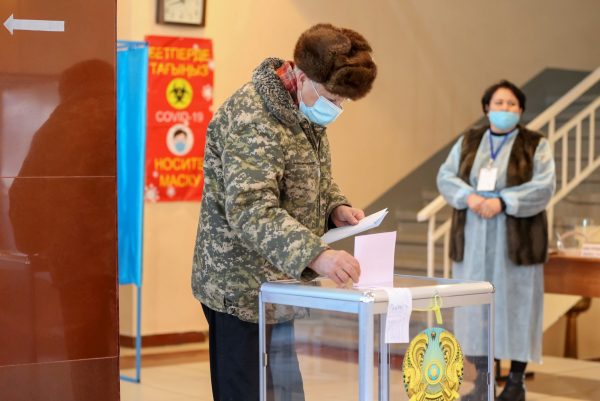There was a palpable lack of excitement about the poll. Following a month-long campaign, the ruling party Nur Otan — chaired by former president Nursultan Nazarbayev — won comfortably, securing 71 per cent of the vote and 76 seats.
Four other parties contested the elections. Two of them, Ak Zhol and the People’s Party of Kazakhstan (PPK) — which shed the word ‘communist’ from its name in November 2020 — managed to clear the 7 per cent vote barrier and will also be represented in the new Majilis.
This tripartite configuration is an almost exact replica of the 2012 and 2016 legislatures, indicating the emergence of a stable ideological spectrum in parliament. Ak Zhol and the PPK represent nationalist and left-wing opposition, respectively, to the centrist Nur Otan.
Western critics of the election focussed on the artificial and controlled nature of such ‘opposition’, arguing that ‘voters had no genuine political alternatives to choose from’. They also commented on the difficulties independent observers faced and the police crackdown on an election protest in Almaty.
Meanwhile, the Speaker of the Russian Duma called the election ‘open and competitive’ and encouraged the United States, ‘with its archaic and closed electoral system’, to learn from Kazakhstan’s experience. Such comments can be read as intentionally inflammatory to a Western audience. It is clear that Kazakhstan is following the Kremlin’s technique of nurturing and perfecting an apparatus of parliamentary ‘systemic opposition’ to forestall the rise of radical challengers to the regime.
Kazakhstan’s President Kassym-Jomart Tokayev — who formally sits above party politics — characterised the election as a ‘step forward in the development of our democracy’ and an ‘examination for civil society’. As far as the authorities are concerned, the examination was passed with flying colours.
Protests against the allegedly unfair elections were decidedly low-key. An appeal from the main opposition figure based in Europe to hold mass rallies and ‘smash the regime’ fell on deaf ears. Thirty or so protestors detained by police in Almaty were quickly released, with Tokayev promising that there would be no reprisals against those espousing ‘the protest mood’.
Compared to Belarus and Kyrgyzstan in 2020 — where national elections triggered mass anti-government mobilisation — Kazakhstan turned out to be an island of tranquillity. If anything, it is resigned to the status quo. Addressing the first sitting of the new Majilis, Tokayev took full credit for this state of affairs, praising the executive branch’s prudent action during the COVID-19 pandemic and calling on parliamentarians to provide legislative support for his initiatives.
The extent to which this support materialises will depend not so much on the ideological inclinations of parliamentarians or their connection with the needs of ordinary citizens, but rather on the ongoing political transition in Kazakhstan’s governing elite.
Despite Nazarbayev’s resignation in March 2019, he retains control over much of the country’s politics. Tokayev, while proclaiming fidelity to the former president’s vision for the country, has been working hard to consolidate his power in the year and a half since he was elected. One episode in this struggle was his sacking of Nazarbayev’s daughter Dariga from her post as chair of the Senate in May 2020. The Senate — whose members are dependent on the serving president — is evolving to be Tokayev’s stronghold.
The newly elected Majilis can play an important role in mediating this dual authority. Nazarbayev’s Nur Otan controls the lower house, which now includes Dariga Nazarbayeva, who staged a return to public politics as a parliamentarian. The lower house could make Tokayev’s life difficult should he be seen to overstep the line. It may go so far as to abolish the Senate altogether and move the country from a presidential republic to a parliamentary–presidential system.
Such radical action is unlikely at present. But the situation may change in the lead-up to the all-important presidential election in 2024. Should members of the ruling elite close to Nazarbayev decide against Tokayev’s second term in office, the Majilis will become a crucial political battlefield.
Kirill Nourzhanov is a Senior Lecturer at the Centre for Arab and Islamic Studies, the Australian National University.

